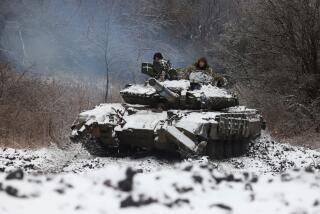B-52 Deployment Breaks SALT Pact : Gorbachev Calls U.S. Violation a ‘Major Mistake’
- Share via
NEW DELHI — The U.S. move to abandon the nuclear weapons ceilings of the the second strategic arms limitation treaty is a “major mistake,” Soviet leader Mikhail S. Gorbachev said Friday.
Such a step will make it harder to negotiate new Soviet-American arms control agreements, Gorbachev warned at a news conference winding up his first visit to India.
Gorbachev said that the deployment of the 131st B-52 modified to carry cruise missiles, which put the United States over the SALT II ceiling Friday, showed U.S. “contempt” for the arms control process.
The new capability of the bomber, which arrived Friday afternoon at Carswell Air Force Base near Fort Worth, Tex., puts the U.S. total above the limit of 1,320 launchers for land- and sea-launched intercontinental ballistic missiles with multiple warheads and bombers armed with cruise missiles.
A Kiss on the Cheek
With a kiss on the cheek for Indian Prime Minister Rajiv Gandhi at the airport, the Kremlin chief later flew back to Moscow with fresh support for his nuclear disarmament proposals.
Gandhi, who declared Gorbachev to be a bold crusader for peace, supported Moscow’s arms control position almost down the line.
Gorbachev, 55, and Gandhi, 42, found much in common since both came to office and both pledged to achieve rapid economic improvements for their countries.
They reported that traditional Indo-Soviet ties were strengthened significantly during their four days of meetings.
On other issues, Gorbachev took these positions:
--He said that there is some encouraging movement in the search for a political settlement of the war in Afghanistan and that he does not expect an estimated 115,000 Soviet troops now in that country to be there indefinitely.
--He insisted that recent Soviet attempts to improve its relations with China will not “weaken our relations with India,” despite India’s fears about its giant northern neighbor.
--He refused to take sides in the Indian-Chinese border dispute, saying that the two countries should work out the differences between them on their own.
Lance-Bearing Guards
The news conference was held in the ornate Ashok Hall of the presidential palace, once the residence of British viceroys. A dozen lance-bearing guards in scarlet tunics and white leather gauntlets were posted around the room.
Gandhi, appearing with his Soviet guest, announced that Indo-Soviet trade would increase 2.5 times in the next five years as a result of their talks.
Before the meeting, both sides expressed concern about the rising trade surplus in India’s favor, mainly due to falling prices for Soviet oil.
The Soviet Union, however, extended a 1.5-billion ruble loan (about $2.2 billion at the official exchange rate) to help India build a new hydro-electric plant and other major industrial projects.
Both men described their 10 hours of private talks as a milestone in Indo-Soviet relations that would bring the two nations even closer in the future.
“Mr. Gandhi and I see eye-to-eye,” Gorbachev said about their common views on nuclear disarmament and the importance of easing international tensions.
Responding to a question about the Washington decision to exceed SALT II limits, Gorbachev said he had read news reports but had not received any White House confirmation of it.
“If that position has been taken, . . . it is contradictory to the entire logic of the Reykjavik talks” that he held with President Reagan in October “and to the statements of the U.S. side after Reykjavik that the U.S. side remains committed to negotiations, to a search for disarmament,” he said.
“If this is true, at this time they are demonstrating contempt for this important treaty, also for the ABM (Anti-Ballistic Missile) treaty,” he added. “We regard this as a major mistake which will make it more difficult to search for the approaches for disarmament.”
The SALT II treaty was signed in 1979 by then-President Jimmy Carter but was never ratified by the Senate because of the Soviet invasion of Afghanistan. Its limitations, however, have been observed by the United States until now.
Soviet spokesmen in Moscow had condemned the impending U.S. action after it was made public, but Friday’s statements were Gorbachev’s first public reaction.
When he was pressed on the issue of Soviet troops in Afghanistan, Gorbachev said that there now seemed to be better prospects for a political settlement. Folding his arms across his chest, he denied at one point that 4 million Afghans fled the country because of the 1979 arrival of 100,000 Soviet troops.
When he was asked to explain why the Afghan refugees left their homeland, however, Gorbachev never gave a direct reply.
At one point, he said that Afghan mediation efforts by U.N. official Diego Cordovez were getting some results.
‘We Will Leave Afghanistan’
“There is movement emerging there--reciprocating movement,” he said. “It’s a little awkward to discuss here when there’s a very concrete search on for a solution. I wouldn’t want to impede that process.”
Later, he said: “It’s up to the Afghan people to decide what regime they will have. . . . We will leave Afghanistan. . . . We cannot accept or tolerate a situation in which Soviet troops will remain in Afghanistan.”
More to Read
Sign up for Essential California
The most important California stories and recommendations in your inbox every morning.
You may occasionally receive promotional content from the Los Angeles Times.













